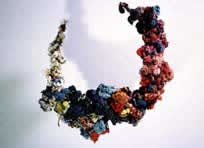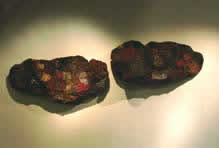Minami Ishibashi
The 2001 Knitting & Stitching Show:
exhibited work


I experimented with many different weights and thickness of yarn and tried many unusual types of material - such as plants, vines, packing twine, paper, clothes or steel wire. I also tried to find ways to create complex combinations of simple 'knit and pearl' stitches and sometimes developed new stitches of my own. I also liked to try out strange combinations of yarn. In one instance I made a matt coloured tapestry by changing yarn each row, or sometimes changing it every stitch.
The knitted stitch is formed by loops and whilst this brings a natural elasticity it's natural tendency is to 'flop'. Is it possible to make knitting that can stand up by itself? This is what I wanted to find out.
I knitted with thick yarns, but used finer needles.
I added spin to yarn to make it more wiry, and knitted with it.
I spun and joined yarns together as if making rope, and knitted with it.
I combined knitting with other techniques, such as, embroidery or knotting.
It has been not so easy.
Although I also make wearable knitting this is not my main theme.
What can I hope to achieve through knitting…?
My exploration will continue….